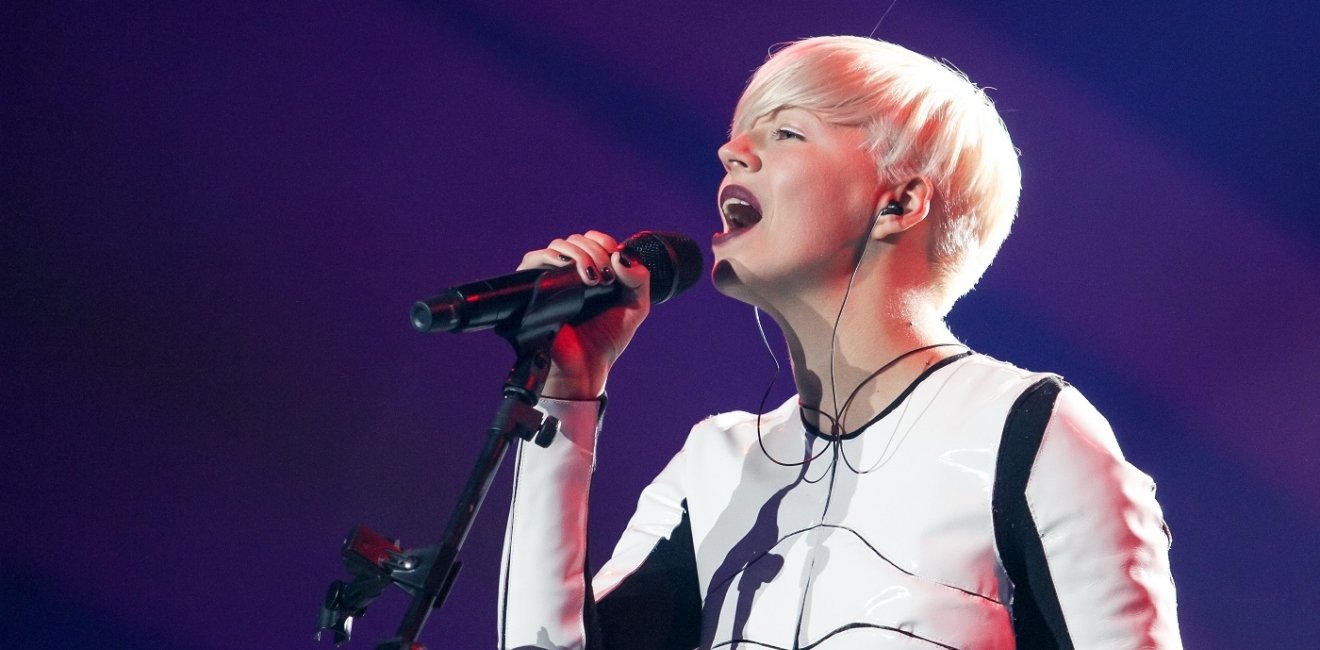
A blog of the Kennan Institute
Ukrainian rock phenomenon Onuka (Granddaughter), an electro-folk band fronted by the iconic Nata Zhyzhchenko, spent this past autumn touring Ukraine, from Chernivtsi in the northeast to Odesa in the south, from Dnipro in the east to Lutsk and Lviv in the west, with two concerts in Kyiv halfway through the journey. This voyage celebrating the band’s new album Room would have been noteworthy under any condition for a band the Odessa Review once called “one of the brightest pop cultural phenomena of 21st century Ukraine” back in 2018. War makes these performances even more important now.
Onuka has been a cultural sensation, pointing the way to a new Ukraine that is both modern and respectful of tradition. The band’s unique blend of traditional folk instruments, such as the bandura and sopilka, with cutting-edge electronic music demonstrates how Ukraine can be part of a global culture and true to itself. Beyond the music, the group has featured costumes and sets by Ukraine’s top young designers, giving everything it does a distinctive avant-garde style. The band has been redefining Ukrainian culture since its launch in 2014.
Most listeners associate the band with lead singer Zhyzhchenko. The granddaughter of renowned folk-instrument maker Oleksandr Shlionchyk grew up splitting her time between the small provincial city of Chernihiv (with a prewar population of around 300,000) and the big city of Kyiv (with a prewar metropolitan population over 3 million). She began performing as a small girl, becoming known as a master of the panpipes. She toured when she was eight, and played as a soloist when she was nine. However, little is more timeworn than yesterday’s “gifted child” and she disappeared from public view during her teen years. Meanwhile, her older brother Oleksandr was earning a reputation as an exciting, rising rock musician.
Zhyzhchenko’s preoccupation with folk music waned when Oleksandr asked her to join his band, Tomato Jaws, around the turn of the century. Her 11 years with that band proved formative, as she both learned about the contemporary music her brother and his bandmates loved—drawn from the Pink Floyd and Depeche Mode repertoires—and began studying ethnomusicology. In 2013, she joined forces with composer Yevhen Filatov to launch Onuka.
Filatov, who would become her husband, and Zhychchenko immediately found an intense fandom with Onuka’s first album, Look. Its release coincided with the Russian annexation of Crimea in 2014, lending energy to the band’s focus on Ukrainian themes. Onuka has been a runaway hit throughout Ukraine and in Europe ever since.
The group’s latest album, Room, is about the power of Ukrainian culture at this moment of war. Blending folk and electro-music seamlessly, the album’s opening number, “Peremona,” has had over a million views on YouTube since it dropped in June. Income from streaming platforms and ticket sales from the tour have gone to charities purchasing medical equipment for military doctors, as well as other war-related needs. At its core, however, the album and the performances, full of futuristic costumes, are about the reimagining of Ukrainian culture that embraces both tradition and innovation.
The tour has additional personal meaning for Zhyzhchenko. In addition to wartime privations and concerns, she started preparing for the tour while she was nine months pregnant with her daughter Leena. She noted on her Facebook page that “when we announced gigs at Kyiv on November 13 and 14, there were many skeptical comments about how brave it is to do something [like that] under the threat of blackouts and shelling. I think the opposite should be done! Against the negative context of our lives! Because that's how we defeat the enemy: we are shot, and we write music, go on tour, give people the opportunity to live our tragic experience together, and raise funds to support the front line. It seems to me that only Ukrainians can do so, and this is our great spiritual victory.”
The band’s base in Zhyzhchenko’s hometown of Chernihiv is meaningful too. She and her husband are members of the “Single Art Space” community of artists dedicated to enlivening that city and region through their creative projects. Chernihiv, it should be remembered, was among the current war’s first battlegrounds, since it stood along the Russian invasion path toward Kyiv. Only 55 miles from the Russian border, this city of 300,000 (before the war) sits astride major transportation routes across Ukraine, north to Belarus, and to Russia. Russian troops besieged the city between March 10 and April 5, 2022, leaving much destruction in their wake.
One of Ukraine’s most ancient cities, the 2022 defense adds a contemporary significance to Chernihiv. Like Zhyzhchenko and Onuka, Chernihiv symbolizes a possible postwar Ukraine that is both modern and traditional, simultaneously.
The opinions expressed in this article are those solely of the author and do not reflect the views of the Kennan Institute.
Author

Former Wilson Center Vice President for Programs (2014-2017); Director of the Comparative Urban Studies Program/Urban Sustainability Laboratory (1992-2017); Director of the Kennan Institute for Advanced Russian Studies (1989-2012) and Director of the Program on Global Sustainability and Resilience (2012-2014)

Kennan Institute
After more than 50 years as a vital part of the Wilson Center legacy, the Kennan Institute has become an independent think tank. You can find the current website for the Kennan Institute at kennaninstitute.org. Please look for future announcements about partnership activities between the Wilson Center and the Kennan Institute at Wilson Center Press Room. The Kennan Institute is the premier US center for advanced research on Eurasia and the oldest and largest regional program at the Woodrow Wilson International Center for Scholars. The Kennan Institute is committed to improving American understanding of Russia, Ukraine, Central Asia, the South Caucasus, and the surrounding region through research and exchange. Read more

Explore More in Focus Ukraine
Browse Focus Ukraine
Talking to the Dead to Heal the Living

Ukrainian Issue in Polish Elections


